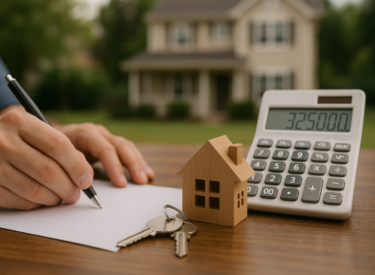Upgrading your home is a very important lifestyle decision that will have a significant impact on your standard of living.
However, it is also a very important financial decision.
Making wise choices can greatly improve your financial position, but mistakes can be very costly and impair your ability to build wealth.

(1) Approach the decision with an investment lens
Traditionally, we don’t buy our homes with a financial motive.
Most people want to live in a location they enjoy that is close to work, schools, family, friends, and other interests.
These tend to be the main considerations.
However, if you buy well, a home can be a wonderful investment for a few reasons.
Firstly, homes tend to be aspirational which means we push our financial budget to get into a desirable area.
Secondly, we tend to hold homes for a long period, often many decades, which means we enjoy the power of compounding capital growth.
And lastly, thanks to the main resident CGT exemption, the capital growth is tax-free.
It is for these reasons that I encourage people to apply an investment lens when choosing which home to buy.
Put differently, I encourage people to buy a home that would otherwise make a wonderful, long-term investment.
This is often achievable as investment-grade properties, by definition, should appeal to a wide audience by being situated in a desirable location, the dwelling is appealing, liveable with a good floor plan, most amenities are in close proximity and so on.
Whilst acknowledging that lifestyle considerations are paramount, it’s often possible to find a home that aligns with both lifestyle preferences and investment objectives.
By prioritising properties with strong investment potential, homeowners can enjoy the best of both worlds.
(2) Be realistic whilst also aggressive
It’s advisable to stretch your comfort zone and borrow more so that you can afford to buy a higher-quality home.
However, it’s crucial not to overextend yourself to the point where it hinders your ability to invest outside of the family home in the future.
Many people adopt the mindset that they should limit home loan borrowings as much as possible.
However, this approach can be counterproductive, as minimising your borrowings and therefore budget invites you to make costly compromises on aspects of the property to get into your desired suburb.
Such compromises may include purchasing a property located on a busy main road, one with a poor floor plan, or a block with an irregular shape, among others.
Instead, it’s advisable for most people to maximise their borrowing capacity up to their comfort limit, to maximise their budget, enabling them to purchase the highest quality property available.
Doing so will likely maximise future capital growth and equity. You can then borrow against this equity in the future to invest in other assets, such as property or shares.
While increasing borrowings does help you buy a higher-quality asset, it’s crucial to avoid over-borrowing.
You’ve borrowed too much if your home loan repayments consume most of your income throughout your working years, hindering your ability to invest in assets outside of the family home.
It’s essential to have both a debt repayment plan and an investment strategy in place, ensuring that you can fund retirement without relying on selling or downsizing your home.
Over-borrowing jeopardises your ability to enjoy a comfortable retirement.
Therefore, it is critical to determine the right level of borrowings – enough to allow you to buy a high-quality home, but not too much that it becomes a financial hindrance.

(3) Should you retain your existing home as an investment?
Homeowners typically have strong emotional attachments to their properties, which can cloud their judgment.
While many believe their home would make a good investment, this is often not the case.
When considering whether to retain your existing home it’s essential to assess factors such as borrowing capacity, loan-to-value ratios, and cash flow.
Often there is too much ungeared equity in existing homes which is inefficient and means owners are better off selling.
If retaining your current home isn’t financially feasible, selling the existing property becomes a straightforward decision.
If retaining the existing home as an investment is viable, seeking independent advice is crucial.
This ensures an objective evaluation of whether the property possesses sufficient positive attributes to warrant it investment worthy.
(4) Try to buy first and sell later
Selling your current home before finding a replacement property presents the challenge of uncertainty regarding the timeframe to secure a new home.
Without purchasing a new home before your current one settles, you risk being without accommodation.
However, committing to a 12-month lease might not be desirable if you anticipate finding a suitable home to buy soon.
This dilemma makes selling first less than ideal.
It is also more convenient to sell your existing home after you have moved out.
This avoids having to prepare for 2-3 open houses per week, which can be quite disruptive and stressful, especially if you have a young family.
When considering buying first, two key factors must be considered.
Firstly, it’s crucial to have realistic expectations regarding the potential sale price of your existing home.
It is best to be quite conservative in your calculations. Secondly, you must assess whether you have the financial means to acquire a new property before selling your current one.
Several options exist for financing in this scenario.
Firstly, if your income and equity allow, you may have sufficient borrowing capacity to purchase the upgraded home without the pressure to sell your current property.
This scenario is ideal as it provides flexibility and control in timing the sale.
Secondly, bridging finance may be an option, enabling you to borrow a higher amount under the condition that you sell your existing home, typically within 12 months.
It’s important to note that bridging finance usually attracts a higher interest rate compared to traditional mortgage finance – more than 2% p.a. higher.
You may intend to sell your current home immediately after buying a new one and align the settlement dates for both transactions.
If you are not successful in doing that, you can use bridging finance as a backup solution.
Lastly, assistance from family members, such as lending money or leveraging the equity in their property via a family guarantee, may provide additional financial support for purchasing the new home before selling the current one.
The best case is to organise yourself so that you can buy before you sell, purchase with a long settlement period (90+ days) and do your best to sell your existing so that settles only a few days after the purchase of your replacement home (or on the same day).
(5) A team to help you
When it comes to upgrading your home, like many financial decisions, there are numerous factors to consider, necessitating input from various professionals.
Therefore, it’s advisable to assemble a skilled team to guide you through the process.
Firstly, consulting a mortgage broker is essential to determine your borrowing capacity and explore options for bridging finance.
A financial advisor can assist in establishing a suitable borrowing budget for the upgrade, aligning it with your long-term retirement plan.
Your tax agent can provide insight into the tax implications of converting your current home into an investment property and how to maximise your negative gearing benefits.
However, perhaps the most crucial assistance comes from a reputable buyers’ agent.
They offer invaluable advice to help you purchase a high-quality home and optimise the sale of your existing property through vendor advocacy services.

(6) Be as unemotional as possible
Remaining completely unemotional when making financial decisions can be challenging, especially when it involves your current or prospective home.
Our emotions often impact our financial decisions unconsciously.
A buyers’ agent will take time to understand the lifestyle attributes important to you.
They can then integrate these with investment fundamentals to help you find an upgraded home that meets both your lifestyle and investment goals.
This approach prevents falling for the wrong property or being swayed by superficial features.
Having a “voice of reason” ensures your budget is wisely spent. Buying a home can be a stressful process – a buyers’ agent has the advantage of having no emotional attachment.
Similarly, when selling your existing home, it’s crucial to receive unbiased advice on matters like property presentation, potential pre-sale cosmetic improvements, timing, and selecting the right agent.
A buyers’ agent, representing your interests, is best equipped to provide such guidance.
Selling can be stressful, particularly if complications arise, such as market fluctuations or negative feedback.
A buyers’ agent serves as a buffer between you and the agent, reducing stress and ensuring you take steps to maximise your net sale proceeds.
We strongly recommend engaging a reputable buyers’ agent when upgrading your home, especially if you are keen to maximise long-term financial outcomes.
(7) Buy low, sell high
Selling your existing home during a strong market may tempt you to postpone purchasing until the market cools down.
However, this strategy carries a lot of risks, as re-entering the property market with confidence can be challenging, potentially causing you to miss opportunities.
Conversely, selling in a soft market may lead to disappointment.
Yet, it’s worth considering that if you bought your upgraded home during such a market, you likely paid less than you would have in a robust market.
Timing the market is inherently challenging.
Your aim should be to buy and sell within the same market conditions to mitigate risks and maintain balance.
Don’t try to time the market.
Life changing, if you do it well…
Investing more than initially considered reasonable in upgrading your home could potentially be one of your best investment decisions.
It will likely enhance your quality of life and boost your net worth through tax-free capital growth.
Upgrading your home is likely one of the most important decisions you’ll ever make in your lifetime.














